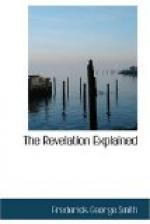The slaughter and devastation that followed this storm of “hail and fire” is thus described: “The banks of the Rhine were crowned like those of the Tiber, with houses and well-cultivated farms; and if a poet descended the river, he might express his doubts on which side was situated the territory of the Romans. This scene of peace and plenty was suddenly changed into a desert, and the prospect of the smoking ruins could alone distinguish the solitude of nature from the desolation of man. The flourishing city of Mentz was surprised and destroyed, and many thousand Christians inhumanly massacred in the church. Wurms perished after a long and obstinate siege. Strasburg, Spires, Rheims, Tournay, Arras, Amiens, experienced the cruel oppression of the German yoke, and the consuming flames of war spread from the banks of the Rhine over the greatest part of the seventeen provinces of Gaul. That rich and extensive country, as far as the ocean, the Alps and the Pyrenees, was delivered to the barbarians, who drove before them, in a promiscuous crowd, the bishop, the senator and the virgin, laden with the spoils of their houses and altars.”
Another historian describing the same, a few years after the event, says: “The barbarians meeting with little resistance, indulged in the utmost cruelty. The cities which they captured, they so utterly destroyed that no traces of them now remain, except in Thrace and Greece, except here and there a tower or a gate. All the men who opposed them they slew, young and old, and indeed spared not women, nor even children. Whence there is still but a sparse population in Italy. The plunder which they seized in every part of Europe was immense, and especially at Rome, where they left nothing, either public or private.” In this latter description reference is also made to some later invasions, but they were all of the same desolating character.
These historical facts show how the green grass, or the feebler portion of society—the tender sex, the young, and the aged—were consumed before this fearful storm of hail and fire; and also how the trees, or the stronger portion—those better able to make resistance—suffered greatly.
It is also a fact to be observed that these fierce tribes which overran Italy, harassed or captured Rome repeatedly, and threatened the overthrow of the empire, made no permanent settlement in that territory. “Under Alaric the Goths make no lasting settlement. In the long tale of intrigue and warfare between the Goths and the two Imperial courts which fills up this whole time, cessions of territory are offered to the Goths, provinces are occupied by them, but as yet they do not take root anywhere; no Western land as yet becomes Gothia,”—Encyclopaedia Britannica, Art. Goths. After the death of Alaric (A.D. 412), however, they settled in the southern part of Spain and Gaul[5]—part of the territory of the West—but they no longer threatened the life of the empire; but, on the contrary, they became allies of the Romans in opposing the dreadful incursions of the Huns and other barbarians. Thus their invasion of the West was at first terribly destructive—like a storm of hail and fire—but their ravages soon ceased, except in their disastrous and weakening effects.




